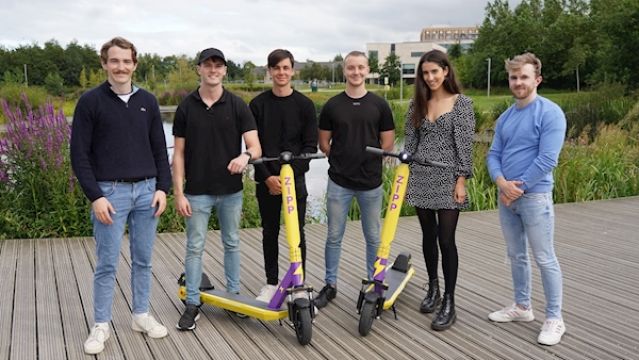The company, founded by 24-year-old Charlie Gleeson last year, is headquartered at a centre for entrepreneurs at UCD.
The UK government is fast-tracking trials of rented e-scooter schemes as part of a strategy to improve congestion and explore greener methods of urban transport in response to the Covid-19 pandemic.
The use of electric or e-scooters on public roads is currently illegal in the Republic, as they are classified as "mechanically propelled vehicles" subject to controls such as road tax and insurance, which are currently impossible to attain for the transport devices.
It re-affirms that our bid for a more sustainable, responsible and transparent approach to the industry is one that is being readily welcomed by authorities.
Founder Charlie Gleeson said the UK approval confirms “confidence in the safety of our e-scooter, it also re-affirms that our bid for a more sustainable, responsible and transparent approach to the industry is one that is being readily welcomed by authorities.”
“Rapid urbanisation is a phenomenon that has aggravated a multitude of problems that city authorities face. However, it presents a fantastic opportunity for innovation, with the ongoing Covid-19 pandemic only proving further reason for new approaches needed.”
The company is headquartered at NovaUCD, the centre for new ventures and entrepreneurs at University College Dublin.
In June it closed a €300,000 seed investment round led by a London-based VC and private angel investors, and expanded its team to target the UK e-scooter market.
If cities truly want to advance towards their carbon emissions targets in the post-Covid era, then socially distanced modes of transport like electric scooters must be considered as an integral component of urban transport strategy.
The company is now currently engaging with a number of councils to secure e-scooter licences to provide their transport to commuters across the UK, claiming that its e-scooter fleet and swappable battery is 10 times more efficient than the widely-used gig economy model.
Head of growth and government affairs at the company Will O’Brien said “cities need scooter-sharing now more than ever due to the impact Covid-19 is having on public transport.”
“We cannot let people revert back to car usage after years of progress in encouraging alternative modes of transport.
“If cities truly want to advance towards their carbon emissions targets in the post-Covid era, then socially distanced modes of transport like electric scooters must be considered as an integral component of urban transport strategy.”







